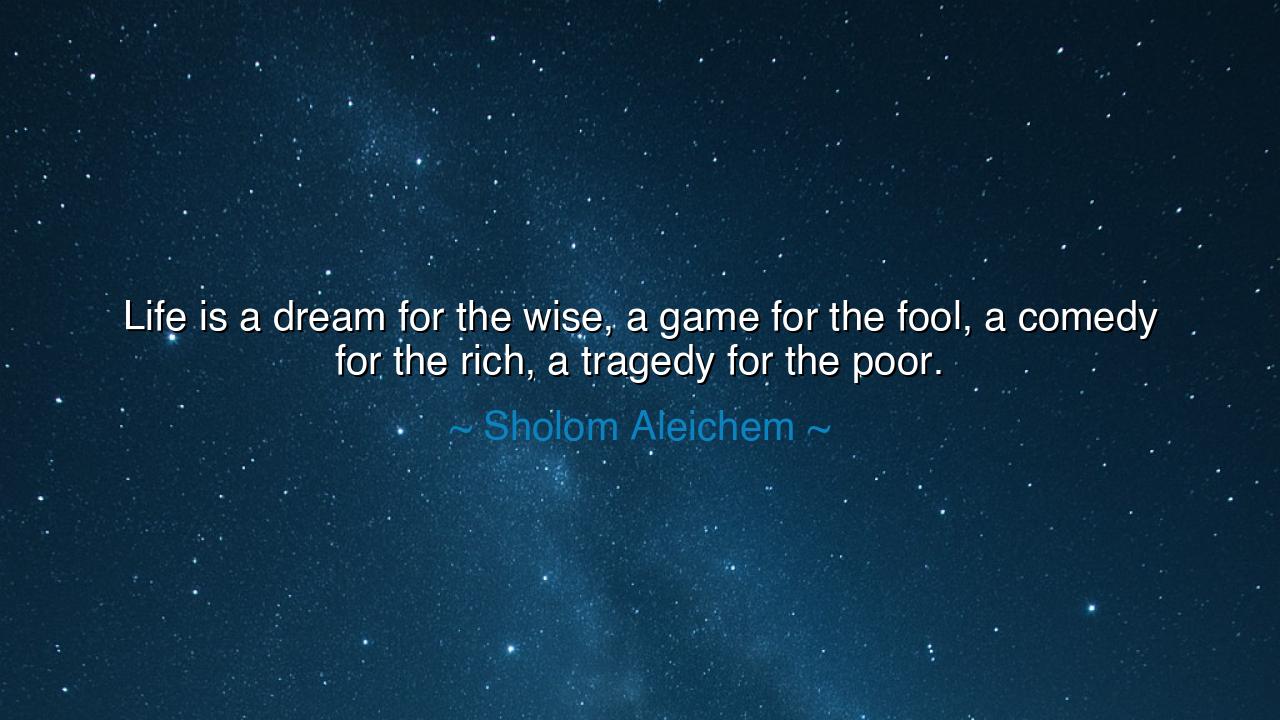
Life is a dream for the wise, a game for the fool, a comedy for
Life is a dream for the wise, a game for the fool, a comedy for the rich, a tragedy for the poor.






“Life is a dream for the wise, a game for the fool, a comedy for the rich, a tragedy for the poor.” Thus spoke Sholom Aleichem, the great storyteller of the Jewish people — a man whose laughter carried the weight of sorrow, and whose words revealed the music hidden within the pain of existence. In this saying, he paints a portrait of human life in all its contrasts — its illusions, follies, and injustices. With a single sentence, he captures the truth that life is not one thing for all men, but many things, shaped by the soul that perceives it and the station into which one is born.
To the wise, life is a dream — not because it is unreal, but because they see through the veil of appearances. The wise man knows that everything passes: joy and grief, wealth and ruin, love and loss. He walks through the world as through a vision — luminous, fleeting, ever-changing. He does not grasp too tightly at the pleasures of the hour, for he knows they are but shadows of eternity. Like the philosopher Socrates, who drank the hemlock with calm, the wise understand that life is but a stage between worlds. Thus, they live in peace, for they have awakened from the dream, even while still within it.
To the fool, however, life is a game — a thing of chance and noise, where one seeks pleasure without thought and fortune without labor. He throws the dice of fate with reckless laughter, believing himself clever while the years slip through his fingers like sand. The fool chases vanity as if it were truth, and spends his strength on trifles. History is filled with such men — kings who played with kingdoms, gamblers who lost empires, souls who mistook luck for wisdom. They live not as if life were sacred, but as if it were sport — until the game ends, and the silence falls.
For the rich, life becomes a comedy — a play performed for their amusement. Shielded by wealth from the harsher winds of existence, they may mistake suffering for spectacle, and the struggles of others for entertainment. To them, tragedy is a story told by actors, not a pain that enters their homes. Yet Aleichem, himself no stranger to poverty, wrote these words not in bitterness, but in understanding: for even the rich, in their laughter, are prisoners of illusion. Their comedy is fragile, built upon fortune’s whim. When the curtain falls, all men — king and beggar alike — must face the same darkness.
But for the poor, life is indeed a tragedy. It is the story of endurance beneath the weight of necessity, of dreams crushed beneath the grindstone of survival. Yet even here, Aleichem’s wisdom shines with compassion rather than despair. For though the poor may know hunger and hardship, they also know the depth of love, the strength of faith, and the sweetness of small joys. The tragedy of their life is not only in their suffering, but in the world’s blindness to their dignity. The tears of the poor are the unacknowledged poetry of the earth — a reminder that the soul’s worth is not measured by its fortune, but by its endurance.
Aleichem’s words were born from his own life — a man of wit and warmth who rose from poverty to fame, only to lose his wealth and health before his death. Through laughter and lament, he became a voice for those whose pain went unheard. His characters, like Tevye the Dairyman, wept and joked in the same breath, teaching that laughter is not the denial of sorrow, but its transformation. To him, humor was holy — a defiance of despair, a way to wrestle with life’s injustices and still call it good. His quote is thus not a cynic’s mockery, but a philosopher’s truth wrapped in the cloak of irony.
The meaning of this wisdom, my child, is clear: life reflects the heart of the one who lives it. To the wise, it is a mystery to be contemplated. To the fool, a toy to be broken. To the rich, a masquerade. To the poor, a struggle carved in tears. Yet the challenge to us all is to see beyond these roles — to awaken, as the wise do, and recognize that joy and sorrow, comedy and tragedy, are but threads in the same tapestry. To live well is to see both laughter and pain as teachers, and to rise above circumstance with compassion for all.
So take this lesson and let it dwell in your spirit: be wise enough to dream, humble enough to laugh, grateful enough to endure, and kind enough to understand. Life will be many things — a dream, a game, a comedy, a tragedy — but you may choose how to live within it. Walk gently among others, for they too are playing their part upon this fragile stage. And when your own curtain falls, may it be said of you that you saw life not as a fool’s game or a rich man’s comedy, but as a divine dream — lived with wisdom, compassion, and grace.






AAdministratorAdministrator
Welcome, honored guests. Please leave a comment, we will respond soon